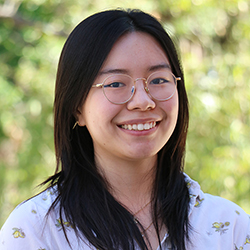Grad Student Part of Winning Lab-Meat Team
March 1, 2022
 A Huntley College of Agriculture graduate student helped develop a sustainable process for producing lab-grown meat and earned the top prize in an innovative high-stakes competition.
A Huntley College of Agriculture graduate student helped develop a sustainable process for producing lab-grown meat and earned the top prize in an innovative high-stakes competition.
Lillian Wang competed in Cultivate Tomorrow, an event created by graduate and undergraduate students from around the country, to promote “cellular agriculture”: producing food from cell cultures.
“It is a relatively new and highly interdisciplinary field that combines biotechnology, molecular biology, chemistry, and engineering,” Wang said. “Cellular agriculture deserves recognition for its importance as it is a proposed method of producing food sustainability, especially when it comes to meat production.”
The event included the first nationwide cellular agriculture “hackathon” with three different tracks or competitions. Students were placed in teams of four with students from other universities.
Wang, a second-year graduate student in plant science from Cypress, was part of a team with two students from UC Berkeley and one from the University of Washington.
Her team took part in a track or competition that required participants to develop an original research idea employing an underutilized resource to improve food production sustainability. They competed against eight other teams and had two months to create their proposal.
The team’s proposal involved lab-grown meat: developing a “bio ink” to help create meat products through 3D printing.
“Essentially, we want to 3D print meat using chitin, which is one of the most abundant polymers you can find in nature,” Wang said.
Chitin is a polysaccharide that is a major component of fungi and the exoskeletons of arthropods.
“Cellulose was another contender because it is also an abundant natural resource, but we chose chitin in the end because it is a high-volume waste from shellfish and seafood processing factories,” Wang said.
The four team members split a $2,000 prize for taking first place in the underutilized resource track, which was one of three such competitions in the virtual event.
“I really enjoyed working with my team as we put our heads together trying to solve a real-world issue,” Wang said. “My teammates are creative and overall wonderful, so I am glad to work with them.”
Wang earned her bachelor’s degree in molecular cell biology from Cal State Long Beach in 2020. She chose Cal Poly Pomona for graduate school because of its impeccable reputation in agriculture, affordability, and proximity to her home.
She wants to earn a doctorate in plant science become a researcher in plant biology.
The hackathon pushed Wang and her teammates to understand what the cellular agriculture field was about through literature searches and connecting with industry leaders like their assigned mentor.
“At the end of the event, our team learned to be more resourceful and confident, which I think are important if you want a career in research,” she said.
The Cultivate Tomorrow organizers developed the event as an educational and fun way of engaging students who want to learn about cellular agriculture and help them enter the field.
Sponsors for this year’s event included the Merck Innovation Center, Ginkgo Bioworks, Turtle Tree, and Cult Food Science.